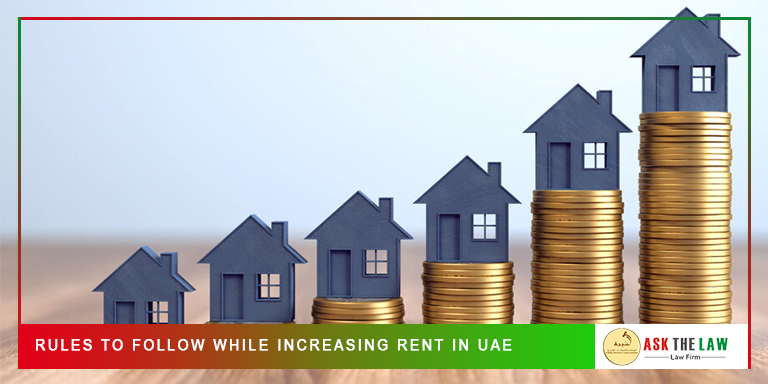
Rules To Follow While Increasing Rent in UAE
What are the rules landlords have to follow while increasing the rent, let’s discuss today. Renting a property is a common practice across the globe, and United Arab Emirates is no exception, especially when property is in UAE, where demand is very much high. A significant portion of the population are expatriates in UAE, and rental properties play a critical role in the UAE’s housing market.
Maintain Transparency
To maintain fairness and transparency, the UAE has established rules and regulations. The landlords must follow when they have to increase the rent. We will be discussing today an in-depth look at these rules. The rules focusing on tenants, landlords, tenant rights, landlord obligations, as well as practical advice for navigating rent-related issues by the top Emirati lawyers from No.1 Emirati Dubai Law Firm.
Regulations: About Rent in UAE
Rent increases in UAE are governed by federal and emirate based laws. The Laws can be little different across all the emirates too. The purpose of such laws is to balance the interests of tenants and landlords, ensuring fairness and stability in rental market. The primary legislation here in United Arab Emirates includes:
- Dubai Tenancy Law 26 of 2007 (including amendments)
It Governs tenancy contracts and rental disputes in Emirate of Dubai. This law also introduced Rental Increase Calculator. It was introduced to monitor and regulate the rent hikes in Emirate.
- Abu Dhabi Rental Law:
This law in Abu Dhabi, provides the guidelines for rent increases and dispute resolution procedures in Emirate of Abu Dhabi. You can book the legal appointment with our lawyers in Abu Dhabi, regards to this law.
- Sharjah Rental Law:
Offers similar protections and rules for landlords and tenants in Sharjah.
- Federal Law # 5 of 1985 (Civil Transactions Law):
This federal law applies to general tenancy agreements. All the tenancy agreements are handled with the help of this law. The law is civil in nature, therefore known as civil transaction law.
Rules Landlords has to follow
- Attachment to Notice Periods
Landlords must have to provide written notice of a rent increase. It has to be at least 3 months (90 days), prior the end of the tenancy contract. It has to be before 3 months. Any delay will not be considered as excuse. The notice must be sent through registered E-Mail, Post, or any legally acceptable medium. The landlord must have that receipt of serving that letter.
- Compliance Management
Rent increases must have to be aligned with the guidelines. These guidelines are set by the respective Emirate’s rental authority. As per law that index or limit can’t be increased.
Emirate of Dubai:
The Rental Increase Calculator determines the permissible rent hike based on market conditions. It also depends on property’s location. Rent hikes are only allowed if the current rent is significantly below the market rate. Please find the details are below:
- No increase if the rent is within 10% of the market rate.
- 5% increase if the rent is 11 to 20%, below market rate.
- Higher increments, if rent gap is greater than 20%.
Emirate of Abu Dhabi:
No specific rental increase caps, but landlords must justify rent hikes based on market conditions.
Emirates of Sharjah:
Rent increases are prohibited for the first three years of the tenancy agreement. It is illegal in Emirate of Sharjah to increase the rent in 3 years of tenancy.
Justification for Rent Increases
Landlords must provide valid reasons for rent hikes. For example, market demand and comparable rental rates in the area. Property upgrades or added amenities. Such information can also be provided by our lawyers in United Arab Emirates.
Rental Contracts
The terms of the tenancy contract must be respected. Rent increases cannot occur mid-contract unless explicitly stated in the agreement allows the rents to be increased or any relevant alternative. Both parties, have to follow and obey the rules.
Registration with Rental Authorities
All tenancy contracts and the subsequent rent increases, must have to be registered with the relevant authority in UAE, for example:
- EJARI in Dubai.
- TAWTHEEQ in Abu Dhabi.
- SHARJAH MUNICIPALITY in Sharjah.
Tenant Rights in Rent Increase Scenarios
Tenants in the UAE are well-protected under the law. Here are the key rights tenants have when faced with a rent increase:
- Right to Dispute Unreasonable Increases
Tenants can file a complaint in rental dispute resolution center. If they believe that the rent increase is truly and completely unjustified. Let us tell you that RDSC or Rental Dispute Settlement Center operates in Emirate of Dubai.
- Right to Receive Proper Notice
Tenants must receive the legally mandated 90-day notice of any rent increase.
- Arbitrary Evictions: Protection
Landlords cannot evict tenants just to impose his will. There must be valid reasons for eviction include property sale, or owner’s personal use. Renovations can also be a reason. Notice has to be served one year ago.
- Right to Renew Tenancy Contracts
If grounds for non-renewal are provided by the landlord, then renewals are not possible only.
Common Issues and Ways
Despite clear regulations, disputes over rent increases still occur. Some common issues and ways to resolve them, fine below:
- Unjustified Rent Hikes
Ways: Refer to the emirate’s rental laws and file a dispute with the relevant authority if the increase violates guidelines.
- Lack of Proper Notice
Ways: Refuse to accept the rent increase and continue with the existing terms until proper notice is provided.
- Discrepancies in Market Rate Assessments
Ways: Use online tools like Dubai’s Rental Increase Calculator or consult a real estate expert to verify the market rate.
- Eviction Threats
Ways: File a complaint with the rental dispute resolution center to challenge the eviction.
Best Practices for Landlords and Tenants
Practices for Landlords:
Ensure compliance with all legal requirements. Justify rent increases with clear documentation and market comparisons.
Practices for Tenants:
- Understand your rights under UAE rental laws.
- Keep copies of all tenancy agreements and correspondence with your landlord.
- Seek legal advice or file a dispute quickly.
How to Use the Dubai Rental Increase Calculator
The Dubai Rental Increase Calculator is a valuable tool for determining permissible rent hikes. Here’s how to use it:
- Visit the RERA Rental Index Calculator. You can visit on Dubai Land Department’s website.
- Enter the property’s details, including location, type, and current rent.
Consequences
Landlords who fail to comply with rent regulations face potential penalties, including:
- Fines imposed by rental authorities.
- Nullification of unjustified rent increases.
Conclusion
Rent increases are always sensitive issues all over the world as well as in UAE. Many disputes are recorded among landlords and tenants on this subject. Tenants, on the other hand, must stay informed about their rights and take appropriate action to protect their interests. With a balanced approach and respect for the law, both parties can enjoy a harmonious rental relationship in the UAE’s thriving property market. Our Lawyers are great support for the property investors, owners and developers. We have a top team of Emirati Lawyers and Legal Consultants.


